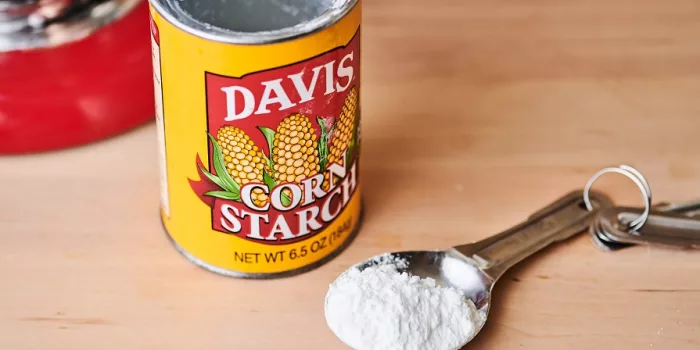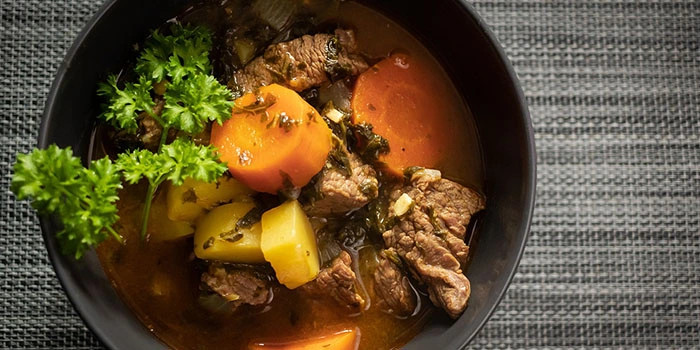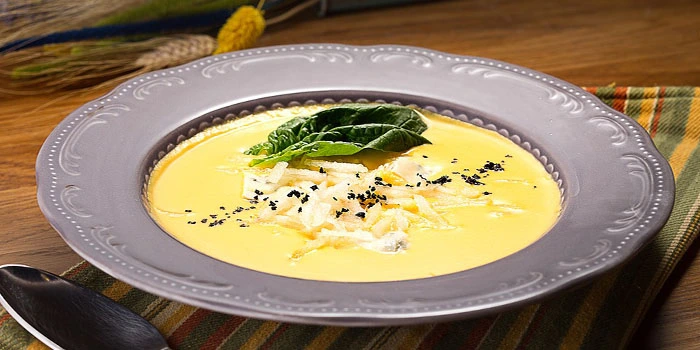Baked goods are favorite snacks for many people, as you can bake something as sweet as a cinnamon bun or as salty as a pizza.
However, the baking process itself is quite complicated because if you follow each step of the instructions and take all the ingredients that the recipe includes if you don’t understand the specifics of the work of certain ingredients, a person can still have problems, such as the problem of distinguishing between baking powder and cornstarch.
This article is an analyzing both of these concepts and the differences between them in various areas, such as baked goods, and whether can they be replaced by each other. Furthermore, you will have an opportunity to get acquainted with homemade baking powder substitute examples.

What are a leavening agent and a thickening agent?
Let’s start with those concepts that can cause the most questions when studying baking powder and cornstarch, as they will often appear in the description of these products.
Leavening agents are the substances that cause the dough you bake to rise, due to the reaction between carbon dioxide, heat, and acid.
If you do not use this substance, your baked goods will be undercooked, too small, and may also become too hard.
Thickening agents are not used to rise the dough, but rather if your dough is too thin, thickening agents help make it more sticky. This helps to form the products that you need from the dough.

Definition of cornstarch, baking powder, baking soda
Before we start breaking down the differences between cornstarch, baking powder, and baking soda, you need to understand the definition of each to analyze what works best for your baked goods method.
What is cornstarch?
Corn starch is a starch that is extracted from corn kernels. Corn is especially popular for adding viscosity to dishes such as soups, as it is used to create corn syrup. Moreover, corn starch can be used not only in baked goods but also in other industrial fields and medicine.
What is baking powder?
Baking powder is a leaving agent that creates carbon dioxide gas and, thanks to the reaction that takes place in the oven, allows baked goods to become fluffier. Baking powder is used in all bakeries and baking industries because, without it, dishes lose their attractive appearance and fresh taste.
What is baking soda?
Baking soda is also the leavening agent, which is used to increase the size of baked goods. What’s more, baking soda is most commonly used at home, as it’s inexpensive and works well for all types of baking. However, if you add too much soda or baking soda cream, you can feel a bitter taste in baked goods, which is especially noticeable in sweet products.

Can you replace baking powder with cornstarch?
Many people who are just starting to cook wonder if it is possible to replace the baking powder with regular cornstarch since they seem to be the same in consistency and in the method of adding the dough.
However, the answer to this is a resounding no, if you are using cornstarch and not baking powder, as the recipe says, your dough will not rise, moreover, the baking itself will be too thick since all the other ingredients that you added are simply mixed in the dough and won’t be able to distribute in a balanced way over the pastries.
Therefore, if you suddenly want to try replacing baking powder, you must be prepared for the fact that the result can be terrible.
Can you replace cornstarch with baking powder?
Surprisingly, in the case of replacing cornstarch with a regular leaving agent, the result may not be bad.
Some manufacturers add a little cornstarch to the baking powder, which means that this baking powder can be substituted with cornstarch.
However, cornstarch will only help the texture of the dish, and in case of taste, everything can go bad. If you are making baked goods, you can generally add some baking powder instead of cornstarch.
But in the case of cooking and soups, where all the flavors are very subtle, the taste of baking powder can completely spoil the dish, although it is creating the desired consistency.

Differences between baking powder and cornstarch
To better understand why it is worth using baking powder and cornstarch at the right moments and not replacing them with each other, you first need to familiarize yourself with the differences between them.
Usage
We will start with the areas of use, something that we have already discussed earlier. Baking powder is mostly used in baked goods so that the dough rises during cooking without being too dense.
Cornstarches are used as thickening liquids, mainly used in sauces and soups, as it helps create a creamy texture.
Appearance
Baking powder is white and powdery. It is very similar to ordinary flour and at the same time has a rather strong smell, especially if you let the spoon with baking powder brew. It also has a rather sharp taste, so there are strict proportions in which it should be used.
Cornstarch is more like regular flour; however, it can have a greenish tinge and is also velvety to the touch, and hasn’t a harsh taste.
Origins
Baking powder is obtained more chemically by mixing acid and sodium bicarbonate, which means it can be called almost completely artificial.
Cornstarch is extracted from the endosperm of corn kernels, which is why it can be called closer to natural products.
Chemical reaction
When you add baking powder to something liquid, you may notice air bubbles from the leavening agent.
Heat and starch molecules interact very well, which is why warm cornstarch begins to thicken after a couple of stirrings when it first interacts with liquid.
Cost
More often than not, baking powder is pricier than cornstarch.

Handy substitutes for baking powder
After we figured out whether it is possible to use cornstarch instead of baking powder, it’s worth figuring out what options exist for substitute baking powder.
Below, you can check out the list of homemade baking powder substitutes.
Buttermilk
The first baking powder substitute is buttermilk, which is made by churning cream into butter.
To use buttermilk instead of baking powder, you need to use baking soda.
You need to take half a cup of buttermilk and mix it with a pinch of baking soda (about 1/4 teaspoon). You can use the finished product instead of 5 grams of baking powder.
Buttermilk is quite liquid and can create the same effect in a dish, so reduce your use of other liquids.
Molasses
The second baking powder substitute is molasses, which is ideal for sweet pastries.
To replace 5 grams of baking powder, you can take a quarter cup of molasses and mix it with a pinch of baking soda.
The molasses along with the baking soda will create the right reaction to help replace the baking powder. Just like with buttermilk, you need to reduce the use of other liquids in your meal.

Plain yogurt
Plain yogurt can also be used as a baking powder substitute because it includes lactose.
To replace 5 grams of baking powder, you might use yogurt and soda, namely half a glass of yogurt and a pinch of soda, that is, a quarter of a teaspoon.
Just as in the process of making baking powder with buttermilk, you can reduce the use of other liquids.
Cream of tartar
Another good substitute for baking powder, especially for savory dishes, is cream of tartar, which is considered a wine powder and also has an acid when combined with baking soda, which can help the dough to rise.
To replace 5 grams of baking powder with wine cream of tartar, you will use only 2 grams of cream of tartar or half a teaspoon, and a quarter of a spoon of baking soda.
Watch the proportions, as too much cream of tartar and baking soda can spoil the taste.
Sour milk
Another good substitute for baking powder is sour milk, as it contains lactic acid which, when combined with baking soda, can expand the dough.
To create a substitute for 5 grams of baking powder, use half a glass of sour milk and a quarter teaspoon of baking soda.
Vinegar
One of the most popular ways to replace baking powder is to use vinegar, as it contains acetic acid, which reacts with baking soda to expand the dough.
To create a substitute for 5 grams of baking powder, you need half a teaspoon of vinegar and a quarter teaspoon of baking soda.
Lemon juice
Lemon juice can also be a great replacement for baking powder, as it has an acid inside that reacts chemically with the baking soda to allow the baked goods to rise.
To replace 5 grams of baking powder, you need to take either ready-made lemon juice, or take a lemon and get the juice from there.
You need a quarter teaspoon of baking soda and half a teaspoon of lemon juice.
We should warn you right away that lemon juice in large quantities can spoil the dish with an extremely sour taste, so use lemon juice to replace a small amount of baking powder.
Club soda
Club soda contains sodium bicarbonate, which in reaction with baking soda can replace the action of baking powder.
To create the effect of a leavening agent, you need to use club soda in place of any other liquid in the recipe, such as water. The reactions between club soda and baking soda produce air bubbles.
Self-rising flour
Another thing that can replace not only your baking powder but also flour and salt is self-rising flour. You don’t need to mix it with baking soda.
Find out ahead of time how much self-rising flour to use in your recipe without baking soda.
Most often, it is perfect to use the same amount of self-rising flour as regular flour, but without the separate addition of baking powder.

FAQ
What can be used in place of baking powder?
Instead of baking powder, you can use self-rising flour, or ingredients combined with baking soda, such as lemon juice, club soda, or buttermilk.
How much cornstarch do I substitute for baking powder?
It all depends on what kind of dough consistency and, as a result, the specific type of dough you want to get after adding cornstarch, and not baking powder.
What happens if I accidentally use cornstarch instead of baking powder?
If you have used cornstarch, which has no common ingredients with baking powder, then your dough won’t rise, and it will become heavy to eat as it will become too dense. Moreover, it may even become too hard to bite.
What is a substitute for 1 teaspoon of baking powder?
1 teaspoon is about 5 grams of baking powder. You can use lemon juice by mixing 1/4 teaspoon baking soda with 1/2 teaspoon lemon juice.
Conclusion
Even though many people think that pie fillings are the main thing in baking, this is not the case, the dough itself must be prepared correctly and using the right ingredients. Baking powder and cornstarch are common ingredients in baked goods, and as the recipe says, are also key to getting the appropriate consistency in dishes.
We hope that after reading this article, you understand much better whether you can use cornstarch and baking soda instead of each other, and what are the differences between them, and now you also know effective recipes for homemade baking powder substitutes with baking soda.





